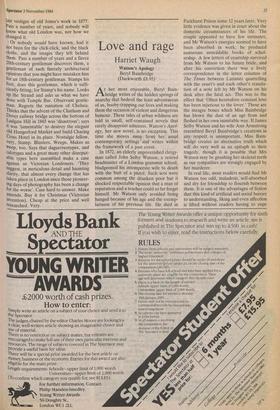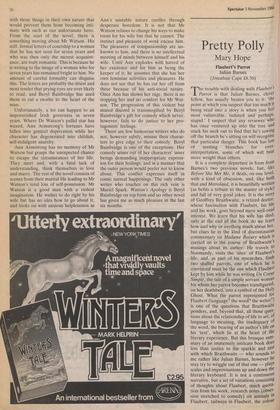Love and rage
Harriet Waugh
Watson's Apology Beryl Bainbridge (Duckworth £8.95)
Aher most enjoyable, Beryl Bain- bridge writes of the hidden springs of anarchy that bedevil the least adventurous of us, booby-trapping our lives and making them the occasion of violent and dangerous humour. These tales of urban wildness are told in small, self-contained novels that rarely disappoint admirers. Watson's Apol- ogy, her new novel, is no exception. This time she moves away from here usual contemporary settings and writes within the framework of a past event.
In 1872, an elderly impoverished clergy- man called John Selby Watson, a retired headmaster of a London grammar school, bludgeoned his intemperate wife to death with the butt of a pistol. Such acts were common among the drunken poor but it shocked respectable opinion that a man of reputation and a teacher could so far forget himself. Mr Watson only avoided being hanged because of his age and the exemp- lariness of his previous life. He died in
Parkhurst Prison some 12 years later. Very little evidence was given in court about the domestic circumstances of his life. The couple appeared to have few intimates, and Mr Watson's energies seemed to have been absorbed in work; he produced numerous unreadable books of schol- arship. A few letters of courtship survived from Mr Watson to his future bride, and after his conviction there was a lively correspondence in the letter columns of The Times between Latinists quarrelling with the court's and each other's transla- tion of a note left by Mr Watson on his desk after the fatal act. This was to the effect that 'Often heretofore constant love has been injurious to the lover.' These are the meagre bones which Miss Bainbridge has blown the dust of an age from and fleshed in her own inimitable way. If James Selby Watson and his wife Ann Armstrong resembled Beryl Bainbridge's creations in any respect is unimportant. Miss Bain- bridge creates an alternative truth which will do very well as an epitaph to their tragedy, though it is possible that Mrs Watson may be gnashing her skeletal teeth as our sympathies are strongly engaged by her murderer.
In real life, most readers would find Mr Watson too odd, maladroit, self-absorbed and dry for friendship to flourish between them. It is one of the advantages of fiction that this kind of artificial and social barrier to understanding, liking and even affection is lifted without readers having to cope with those things in their own nature that would prevent them from becoming inti- mate with such as our unfortunate hero. From the start of the novel, there is something moving about Mr Watson. His stiff, formal letters of courtship to a woman that he has not seen for seven years and who was then only the merest acquaint- ance, are truly romantic. This is because he is writing to the image of a woman who for seven years has remained bright to him. No amount of careful formality can disguise this. The letters are probably the driest and most tender that prying eyes are ever likely to read, and Beryl Bainbridge has used them to cut a swathe to the heart of the man.
Unfortunately, a lot can happen to an impoverished Irish governess in seven years. Where Dr Watson's pallid star has waxed, Ann Armstrong's fortunes have fallen into genteel deprivation while her character has degenerated into childish, self-indulgent anarchy.
Ann Armstrong has no memory of Mr Watson but grasps the unexpected chance to escape the circumstances of her life. They meet and, with a fatal lack of understanding, think themselves in love and marry. The rest of the novel consists of scenes from their marital life leading to Mr Watson's total loss of self-possession. Mr Watson is a good man with a violent imagination. He wishes to do right by his wife but has no idea how to go about it, and looks on with anxious helplessness as Ann's unstable nature curdles through desperate boredom. It is not that Mr Watson refuses to change his ways to make room for his wife but that he cannot. The instinct and pleasure of work encase him. The pleasures of companionship are un- known to him, and there is no intellectual meeting of minds between himself and his wife. Until Ann explodes with hatred of her existence and for him as being the keeper of it, he assumes that she has her own feminine activities and pleasures. He does not see that he has cut her off from these because of his anti-social nature. Once Ann has shown her rage, there is no stopping her and no comfort for Mr Wat- son. The progression of this violent but muted discord is transmogified by Beryl Bainbridge's gift for comedy which never, however, fails to do justice to her pro- tagonists' feelings.
There are few humorous writers who do not, however subtly, misuse their charac- ters to give edge to their comedy. Beryl Bainbridge is one of the exceptions. Her comedy arises out of her characters' inner beings demanding inappropriate express- ion for their feelings, and in a manner that the outer person would prefer not to know about. This conflict expresses itself in comic surreal happenings. The only other writer who touches on this rich vein is Muriel Spark. Watson's Apology is Beryl Bainbridge on top form and no other novel has given me as much pleasure in the last six months.











































 Previous page
Previous page